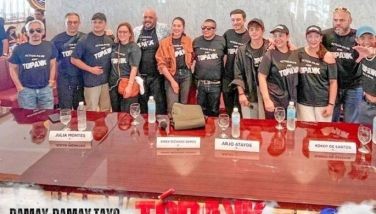Dan Brown says 'Da Vinci Code' is pure fiction
March 30, 2006 | 12:00am
Amid the controversies and reverberating protests surrounding his phenomenal bestseller, The Da Vinci Code, and its upcoming big-screen adaptation from Columbia Pictures, author Dan Brown wishes to set the record straight and explain his side in the following dialogue (which appears in his website danbrown.com.)
Question: How much of The Da Vinci Code is true?
Dan Brown: The Da Vinci Code is a novel and therefore a work of fiction. While the book's characters and their actions are obviously not real, the artwork, architecture, documents, and secret rituals depicted in this novel all exist (for example, Leonardo Da Vinci's paintings, the Gnostic Gospels, etc.). These real elements are interpreted and debated by fictional characters. While it is my belief that some of the theories discussed by these characters may have merit, each individual reader must explore these characters' viewpoints and come to his or her own interpretations. My hope in writing this novel was that the story would serve as a catalyst and a springboard for people to discuss the important topics of faith, religion, and history.
Q: But doesn't the novel's "fact" page claim that every single world in this novel is historical fact?
Brown: If you read the "FACT" page, you will see it clearly states that the documents, rituals, organization, artwork, and architecture in the novel all exist. The "FACT" page makes no statement whatsoever about any of the ancient theories discussed by fictional characters. Interpreting those ideas is left to the reader.
Q: Is this book anti-Christian?
Brown: No. This book is not anti-anything. It's a novel. I wrote this story in an effort to explore certain aspects of Christian history that interest me. The vast majority of devout Christians understand this fact and consider The Da Vinci Code an entertaining story that promotes spiritual discussion and debate. Even so, a small but vocal group of individuals has proclaimed the story dangerous, heretical, and anti-Christian. While I regret having offended those individuals, I should mention that priests, nuns, and clergy contact me all the time to thank me for writing the novel. Many church officials are celebrating The Da Vinci Code because it has sparked renewed interest in important topics of faith and Christian history. It is important to remember that a reader does not have to agree with every word in the novel to use the book as a positive catalyst for introspection and exploration of our faith.
Q: What do you think of clerical scholars attempting to "disprove" your novel?
Brown: The dialogue is wonderful. These authors and I obviously disagree, but the debate that is being generated is a positive powerful force. The more vigorously we debate these topics, the better our understanding of our own spirituality. Controversy and dialogue are healthy for religion as a whole. Religion has only one true enemy-apathy-and passionate debate is a superb antidote.
Q: Are you a Christian?
Brown: Yes. Interestingly, if you ask three people what it means to be Christian, you will get three different answers. Some feel being baptized is sufficient. Others feel you must accept the Bible as absolute historical fact. Still others require a belief that all those who do not accept Christ as their personal savior are doomed to hell. Faith is a continuum, and we each fall on that line where we may. By attempting to rigidly classify ethereal concepts like faith, we end up debating semantics to the point where we entirely miss the obvious-that is, that we are all trying to decipher life's big mysteries, and we're each following our own paths of enlightenment. I consider myself a student of many religions. The more I learn, the more questions I have. For me, the spiritual quest will be a life-long work in progress.
Q: Has anyone in organized religion come out in support of your novel?
Brown: Yes, many people in organized religion have come out in support of this novel, and, of course, many have come out in opposition as well. The opposition generally comes from the strictest Christian thinkers who feel the idea of a "married Jesus" serves to undermine His divinity. While I don't agree with this interpretation, this is immaterial because the dialogue itself is a deeply empowering and positive force for everyone involved. Suddenly, enormous numbers of people are passionately debating important philosophical topics, and regardless of the personal conclusions that each of us draws, the debate can only help to strengthen our understanding of our own faith.
Much of the positive response I get from within organized religion comes from nuns (who write to thank me for pointing out that they have sacrificed their entire lives to the Church and are still considered "unfit" to serve behind the altar). I have also heard from hundreds of enthusiastic priests. While many of them disagree with some of the ideas in the novel, they are thrilled that their parishioners are eager to discuss religion. Father John Sewell of St. John's Episcopal Church in Memphis stated it particularly eloquently in the press recently, saying: "This [novel] is not a threat. This is an opportunity. We are called to creatively engage the culture and this is what I want to do. I think Dan Brown has done me a favor. He's letting me talk about things that matter."
Question: How much of The Da Vinci Code is true?
Dan Brown: The Da Vinci Code is a novel and therefore a work of fiction. While the book's characters and their actions are obviously not real, the artwork, architecture, documents, and secret rituals depicted in this novel all exist (for example, Leonardo Da Vinci's paintings, the Gnostic Gospels, etc.). These real elements are interpreted and debated by fictional characters. While it is my belief that some of the theories discussed by these characters may have merit, each individual reader must explore these characters' viewpoints and come to his or her own interpretations. My hope in writing this novel was that the story would serve as a catalyst and a springboard for people to discuss the important topics of faith, religion, and history.
Q: But doesn't the novel's "fact" page claim that every single world in this novel is historical fact?
Brown: If you read the "FACT" page, you will see it clearly states that the documents, rituals, organization, artwork, and architecture in the novel all exist. The "FACT" page makes no statement whatsoever about any of the ancient theories discussed by fictional characters. Interpreting those ideas is left to the reader.
Q: Is this book anti-Christian?
Brown: No. This book is not anti-anything. It's a novel. I wrote this story in an effort to explore certain aspects of Christian history that interest me. The vast majority of devout Christians understand this fact and consider The Da Vinci Code an entertaining story that promotes spiritual discussion and debate. Even so, a small but vocal group of individuals has proclaimed the story dangerous, heretical, and anti-Christian. While I regret having offended those individuals, I should mention that priests, nuns, and clergy contact me all the time to thank me for writing the novel. Many church officials are celebrating The Da Vinci Code because it has sparked renewed interest in important topics of faith and Christian history. It is important to remember that a reader does not have to agree with every word in the novel to use the book as a positive catalyst for introspection and exploration of our faith.
Q: What do you think of clerical scholars attempting to "disprove" your novel?
Brown: The dialogue is wonderful. These authors and I obviously disagree, but the debate that is being generated is a positive powerful force. The more vigorously we debate these topics, the better our understanding of our own spirituality. Controversy and dialogue are healthy for religion as a whole. Religion has only one true enemy-apathy-and passionate debate is a superb antidote.
Q: Are you a Christian?
Brown: Yes. Interestingly, if you ask three people what it means to be Christian, you will get three different answers. Some feel being baptized is sufficient. Others feel you must accept the Bible as absolute historical fact. Still others require a belief that all those who do not accept Christ as their personal savior are doomed to hell. Faith is a continuum, and we each fall on that line where we may. By attempting to rigidly classify ethereal concepts like faith, we end up debating semantics to the point where we entirely miss the obvious-that is, that we are all trying to decipher life's big mysteries, and we're each following our own paths of enlightenment. I consider myself a student of many religions. The more I learn, the more questions I have. For me, the spiritual quest will be a life-long work in progress.
Q: Has anyone in organized religion come out in support of your novel?
Brown: Yes, many people in organized religion have come out in support of this novel, and, of course, many have come out in opposition as well. The opposition generally comes from the strictest Christian thinkers who feel the idea of a "married Jesus" serves to undermine His divinity. While I don't agree with this interpretation, this is immaterial because the dialogue itself is a deeply empowering and positive force for everyone involved. Suddenly, enormous numbers of people are passionately debating important philosophical topics, and regardless of the personal conclusions that each of us draws, the debate can only help to strengthen our understanding of our own faith.
Much of the positive response I get from within organized religion comes from nuns (who write to thank me for pointing out that they have sacrificed their entire lives to the Church and are still considered "unfit" to serve behind the altar). I have also heard from hundreds of enthusiastic priests. While many of them disagree with some of the ideas in the novel, they are thrilled that their parishioners are eager to discuss religion. Father John Sewell of St. John's Episcopal Church in Memphis stated it particularly eloquently in the press recently, saying: "This [novel] is not a threat. This is an opportunity. We are called to creatively engage the culture and this is what I want to do. I think Dan Brown has done me a favor. He's letting me talk about things that matter."
BrandSpace Articles
<
>
- Latest
- Trending
Trending
Latest
Trending
Latest
Recommended























